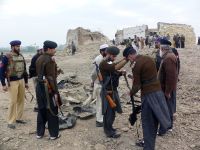Egyptian President Hosni Mubarak on Wednesday brushed off criticism of the emergency Sharm el-Sheikh Middle East summit he hosted, hailing it as a success for ending an Israeli "siege" of Palestinian towns.
"If the Sharm el-Sheikh summit hadn't taken place, the number of dead would long since have reached 200 or 300 people," Mubarak said in an interview on Egyptian state television.
Mubarak highlighted a verbal commitment made by the Israelis at the summit on Monday to withdraw troops from Palestinian towns and reopen international borders with the Palestinian territories after some three weeks of clashes in which more than 100 people have been killed.
He dismissed the fact that no written agreement was signed as irrelevant.
"It's not a question of signing a piece of paper ... it's a question of intentions. If the two sides have the right intention, things can be solved and move in the direction of peace. It's up to them," he said.
The Egyptian president also countered hard-line Arab and Islamic critics who claimed the summit had upstaged a meeting of Arab leaders set for Saturday in Cairo and had undermined the Palestinian uprising against Israel.
"When the siege is lifted, so the people can eat, so they can get medicines, so that life can go on, is that an abortion of the Intifada (uprising) ? It's got nothing to do with the Intifada," he said.
Mubarak conceded that the Sharm el-Sheikh summit, which brought Palestinian leader Yasser Arafat and Israeli Prime Minister Ehud Barak together along with US President Bill Clinton, had not solved everything but insisted that peace would win out over talk of war.
"Of course there's stubbornness from the Israeli side and -- I don't know what -- an unpreparedness on the Palestinian side, so there's a danger here," he said.
"When all these events took place, tensions rose and tempers flared, the deaths increased and the situation became more hostile between the two.
"In order for the peace process to restart, people must calm down and sit down and think objectively.
"That's why work is underway now to withdraw the troops and reopen the roads and then, over two weeks, the American administration will consult the two sides," Mubarak said referring to an agreement to work on resuming peace negotiations.
"During the two weeks they have been given, they will have calmed down and they will have to start negotiating again. They have no alternative," he added.
"To start negotiating about the continuation of the peace process, there must be peace, because a situation like this can never be solved by war. The peace process must continue, there's no escaping that," he said.
"Those who talk of war should understand what it means, its dangers and its effects on their people," the Egyptian president said referring to calls for hard-line Arab action at the upcoming Arab summit.
"Talk of declaring war is out-dated and belongs to the past ... The logic of war has become very long in the tooth. Matters can only be solved by negotiation and international pressure," he said.
Mubarak recalled that the last Arab summit in 1996 had unanimously supported the peace process as the right strategy for securing the Palestinians' rights and the return of land lost in previous wars with Israel.
But he warned that the Arab summit could not fulfil the hopes of all factions.
"Even an Arab summit cannot meet the demands of all the people on the street," he said – CAIRO (AFP)
© 2000 Al Bawaba (www.albawaba.com)







